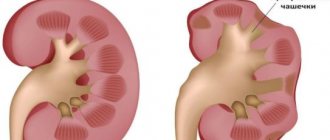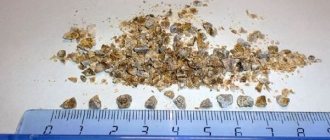Causes
The reasons why bloating and pain in the lower abdomen begin are the same for all people. But it is worth noting that, due to the structure of the body, women have more factors influencing their formation.
It is important to know! Bloating in the lower abdomen can form due to severe gas formation in the stomach.
Causes of the disease:
- the food was wrong;
- intolerance to certain foods;
- various diseases of the digestive tract;
- bad habits;
- internal bleeding.
Why women may experience bloating:
- disturbances in the menstrual cycle;
- uterine and ectopic pregnancy;
- menopause;
- various diseases of the female reproductive system;
- uterine fibroids.
Why does pain appear in the lower abdomen in children:
- digestive system infections;
- problems with stool;
- a rich diet that does not correspond to the child’s age;
- binge eating.
Why does the lower abdomen hurt in men:
- prostatitis;
- diseases of the male reproductive system;
- cystitis;
- the onset of tumor formation.
To understand why it hurts in the lower abdomen, you need to see a doctor. To begin with, it is better to make an appointment with a therapist, who, after listening to the complaints, will be able to advise the appropriate specialist.
Causes of lower abdominal pain in women
However, other diseases can also cause pain, for example, radiculitis, intervertebral hernia, neuritis, appendicitis, etc. And a thorough diagnosis is necessary, all stages of which are carried out in our clinic.
Main reasons
So, to begin with, it’s worth dividing pain in the lower abdomen in women into two large general groups:
- pain that occurs regularly during menstruation at the same time;
- pain that is not associated with the phases of menstruation and is not regular.
The causes of pain can also be divided into two groups:
- organic (diseases of the pelvic organs or adjacent organs, neoplasms, use of intrauterine contraceptives, other obstetric problems);
- functional (pain during ovulation, menstrual irregularities, etc.).
Pain in the lower abdomen in women can be of different types: throbbing, constant or paroxysmal, dull or sharp, strong or aching.
But let's look at the issue in more detail. And it’s worth starting with those reasons that are not related to gynecological ailments. That is, the reason could be:
- problems in the gastrointestinal tract (inflammatory processes in the intestines, gastroenteritis, appendicitis, diverticulitis, constipation, obstruction, cancer, etc.);
- diseases of the urinary system (pyelonephritis, urolithiasis, cystitis);
- musculoskeletal problems (stretched abdominal muscles, divergence of the pubic symphysis, which occurs during premature birth);
- psychological reasons in which pain is a reaction to current events.
If we talk about pain, the appearance of which is associated with the menstrual cycle, then you should pay attention to the following phenomena:
- ovulation is the process of rupture of the follicle and the release of a mature egg, which can cause sharp and acute pain at the beginning of the process and gradually fade away at the end;
- endometriosis is a disease that is accompanied by dull pain in the lower abdomen, which may be accompanied by dysmenorrhea, pain during sex or bowel movements;
- Dysmenorrhea results in dull or sharp pain in the lower abdomen a few days before or during menstruation, which may be accompanied by headache, nausea, frequent urination, constipation or diarrhea.
The list of problems in the body that can lead to pain in the lower abdomen in women is somewhat longer:
- diseases of the pelvic organs of an inflammatory nature, which are characterized by gradual development, they are accompanied by vaginal mucopurulent discharge, pain during intimacy and impaired urination;
- an ovarian cyst that suddenly ruptures causes sharp, severe pain, it goes away within a few hours and may be accompanied by vaginal bleeding, sometimes nausea and vomiting;
- ectopic pregnancy is a source of sharp and prolonged pain accompanied by vaginal bleeding, which can result in loss of consciousness;
- with uterine fibroids, necrosis of the node may occur, which will cause acute pain and vaginal bleeding; most often occurs during the first 12 weeks of pregnancy, after childbirth or after termination of pregnancy;
- torsion of the appendage will lead to the appearance of one-sided acute pain, which, as a rule, is accompanied by nausea and vomiting, pain as a result of touching the abdomen;
- the gradual development of pain may indicate the development of ovarian or uterine cancer; vaginal bleeding also appears even in postmenopause;
- pain that develops gradually, but is characterized by constancy, indicates the presence of adhesions; they can lead to intestinal obstruction, nausea and vomiting, provoke pain during sexual intercourse, and the disease itself can appear as a result of an inflammatory disease or surgical intervention;
- spontaneous abortion will be a source of constant severe pain in the lower abdomen and vaginal bleeding.
Diagnostic methods and treatment
Needless to say, treatment must begin after a detailed diagnosis, which is why it is so important to seek help from a qualified specialist and a clinic that can carry out all types and forms of diagnostics.
When it comes to pain in the lower abdomen in women, the main methods for identifying their cause are:
- medical examination by palpation, instrumental and laboratory methods;
- blood analysis;
- smear analysis;
- Ultrasound of the ovaries, uterus and appendages;
- laparoscopy;
- biopsy and others.
The modern diagnostic equipment of our clinic allows us to carry out diagnostics quickly and as accurately as possible, and the experience of our doctors ensures the accuracy of the diagnosis.
If the causes of the disease are not related to gynecology, then in our clinic you can count on the involvement of specialists from other medical fields.
Only correct identification of the cause of pain allows you to prescribe correct and effective treatment.
Diagnostics
To understand why your stomach is bloated, your doctor will conduct an examination. Symptoms characteristic of flatulence occur differently for everyone; they depend mainly on the disease that caused the bloating.
- the stomach is swollen and there is a feeling of fullness;
- discomfort accompanied by severe pain, which becomes easier after the gases pass;
- pain is felt in the anterior part of the peritoneum;
- strong rumbling begins;
- belching of air and hiccups;
- problems with stool;
- passive lifestyle.
People who experience frequent bloating in the lower abdomen become more nervous, as the constant feeling of fullness brings discomfort to the person.
It is important to know! Constant stress and nervous disorders cause relapse of the disease. Also, with flatulence, a person’s sleep becomes restless, and general weakness of the body is observed.
A swollen belly usually causes heart pain because digestive problems impede blood circulation in the body. Most often, due to bloating, the patient suffers from headaches and high blood pressure.
If the discomfort recurs regularly, you need to make an appointment with a doctor, as the symptoms indicate that the person has a serious disease of the digestive system.
Bloating and pain in the lower abdomen in a woman usually indicate illness not only of the stomach, but also of the genital organs. Most often, painful sensations can appear during menstruation.
Pulling or cutting pain in the lower abdomen
Such pain occurs when one or more organs have increased in size and put pressure on the muscles surrounding them. Why is this happening?
The reasons may be completely different. Let's look at examples from men and women. In both sexes, such pain can cause severe muscle strain and the inability to contract. It is also worth remembering that such pain accompanies sexually transmitted infections. Always pay attention to the color and smell of genital discharge. In a healthy person, the discharge is clear and practically odorless.
Women
Such pain often occurs during menstruation. If they occur on days 12-14 of a normal 28-day cycle, without the usual discharge, then you should immediately contact a gynecologist. This may indicate various inflammations in the uterus and ovaries. If the pain increases during menstruation or becomes unbearable, this indicates rapidly developing endometriosis or more terrible diseases, including cancer.
Pain in the lower abdomen in women often indicates pregnancy, including ectopic pregnancy.
If you experience such pain during sexual intercourse, you should also consult a gynecologist. He will find out why at this moment the uterus is increasing in size, although this should not be the case. If pain occurs during or after urination, this indicates an infection in the bladder. This may be pyelonephritis or cystitis, common in women. Then you urgently need to see a urologist and take a urine test. Don't let the disease lead to kidney stones.
Try to clearly tell the doctor what kind of pain you feel: pulling and cramping. This will help make a diagnosis faster.
Men
It is important for your doctor to understand exactly where and under what conditions you are experiencing pain. In addition to genital infections, these can include inflammation of the prostate and urinary tract, and intestinal lesions.
Such pain indicates chronic prostatitis. They are fraught with problems in sexual life and urinary incontinence. Remember that if you get up to go to the toilet at least once at night, this indicates problems with the genitourinary system. For any pain or discomfort when urinating, consult a urologist. Don't bring it to surgery.
If it hurts on the right side, then it is appendicitis. Go to the hospital immediately. It can “burst” and then blood poisoning occurs.
Also, pain on the right side may indicate a malignant tumor in the intestine. To establish it, an X-ray examination of the intestine is necessary. If pain occurs on the left side when walking or shaking in a car, this is also inflammation of the intestines.
Eleos clinic specialists will answer all your questions. We know how to help you.
Treatment
If a person begins to have problems with flatulence, the first thing to do is switch to proper nutrition, since bloating may occur due to the intake of certain foods. A therapeutic diet will help normalize intestinal function.
When the stomach begins to bloat due to food, the following dishes should be excluded from food:
- fat;
- salty;
- spicy;
- sweet.
If you experience flatulence, you must stop drinking drinks containing gases.
- properly selected nutrition and a gentle diet;
- if flatulence is a consequence of an illness, it should be treated;
- check and tidy up the intestinal microflora;
- excess gases from the intestines must be removed.
Important! If bloating in the lower abdomen appears due to an illness, the doctor will prescribe a special treatment that will help cure the illness, and not just eliminate the symptoms.
To treat discomfort, the doctor selects individual medications. Depending on the course of the disease, medications are prescribed.
Prevention
To avoid flatulence and problems with the digestive system, you need to follow the rules.
Health rules:
- You can’t overeat, you need to eat more often, but less. You should not talk while eating, and you should chew food thoroughly.
- Lead an exceptionally healthy lifestyle. Eliminate bad habits and play sports.
- Have your body examined regularly by a doctor.
By following these basic rules, a person increases immunity. Many diseases will no longer bother him. And regular monitoring by a specialist will help avoid unwanted surprises. After all, flatulence does not appear on its own, so everyone needs to understand whether it was a one-time occurrence or whether there are health problems.
Unpleasant sensations in the abdomen, discomfort, flatulence are common symptoms that can occur in every person. There are many reasons for this, and they are not necessarily related to the disease. Men encounter such problems less often, and bloating in the lower abdomen in women can be a sign of dangerous diseases, and therefore requires attention and consultation with a doctor.
Cutting pain in the lower abdomen in pregnant women
In women during gestation, cutting pain in the abdominal area is an alarming symptom. This is often how various pathological conditions of the fetus or placenta manifest themselves. The development of pain syndrome, which is accompanied by bleeding and periodic cramps in the lower abdomen, is considered especially dangerous. In this case, the patient requires immediate medical attention and hospitalization.
However, it is necessary to seek the advice of a specialist even if the discomfort is mild and episodic. The gynecologist will determine the cause of the problem and prescribe the necessary treatment. It should be noted that cutting pain in pregnant women can be caused by a number of reasons:
- hypertonicity of the myometrium;
- placental abruption;
- stretching of the muscles and ligaments that support the uterus;
- ectopic pregnancy;
- miscarriage or threatened miscarriage;
- uterine rupture;
- divergence of the pubic symphysis.
Abdominal pain during pregnancy
| Nature of the pain syndrome | Gestation period | Possible pathology | Secondary symptoms |
| Extremely intense cutting pain | 5-8 weeks | Ectopic pregnancy | Dizziness, weakness, tachycardia, drop in blood pressure, possible bleeding |
| Intense cutting or cramping pain | From 5-6 weeks until birth | Placental abruption | Cramps in the lower abdomen, bleeding, sudden deterioration in health |
| Sharp or nagging pain when exercising or changing posture | Any gestational age | Stretching of the abdominal muscles and uterine ligaments | Increased pain with active movements |
Attention!
One of the most common causes of acute cutting pain in the lower abdomen in women of reproductive age is tubal pregnancy. This is a dangerous condition that requires immediate medical attention.
Lower abdominal pain in women can be caused by various factors. It is often impossible to independently determine the cause of the development of a pathological symptom. In order to detect diseases in a timely manner, it is necessary to seek advice from a specialist at the first signs of illness. Acne on the chin in women, you can find out by following the link.
Why does flatulence occur?
Excessive accumulation of gases depends on the functioning of the body and leads to unpleasant sensations. Women are more likely to encounter this problem due to the location of the pelvic organs. The feeling of fullness can be caused by completely natural physiological processes or is a symptom of pathological disorders.
Physiological factors
Despite the many reasons that cause the feeling of fullness, most of them are related to physiology. For example, changes in hormonal levels before menstruation lead to discomfort in the lower intestines. Some even feel the moment of release of a mature egg from a burst follicle. Bloating is often observed in women suffering from constipation: stretching of the intestinal walls causes flatulence and pain in the left lower abdomen.
Pregnant women are also susceptible to digestive disorders and flatulence. Their condition is associated with changes in the body and fluctuations in hormone levels. In the second half of pregnancy, the growing uterus compresses the intestines, and transportation of its contents is disrupted. This leads to stagnation and increased gas formation.
Sometimes bloating appears as a reaction to certain types of foods. Increased fermentation occurs in the abdomen, which leads to bloating, discomfort and pain. A “storm” in the intestines can be provoked by:
- highly carbonated sweet drinks;
- vegetables - legumes, radishes, cabbage;
- brown bread, baked goods, sweets;
- a large amount of sweet fruits in the diet;
- nuts.
Flatulence is caused by the predominance of fatty fermented milk products in the menu and the consumption of large quantities of baked goods and confectionery products. A violation of the nutritional culture has an effect: fast food, poorly chewed food. The stomach may swell from dry food or lack of fluid in the body.
Pathological causes
Persistent flatulence over a long period is a reason to consult a doctor. If bloating occurs systematically, this may indicate gastrointestinal diseases. Symptoms of gas formation are observed with gastritis, cholecystitis, pancreatitis, and intestinal inflammation. Often the culprit of the disease is the harmful bacteria Helicobacter pilory.
The list of other pathologies when a woman has blowing and stomach pain is extensive:
- dysbacteriosis;
- infectious intestinal diseases;
- the presence of worms;
- inflammation of the appendix;
- urinary tract infections;
- growth of tumors;
- intestinal obstruction;
- inflammation of the genital organs.
Less commonly, bloating can be caused by neurosis. Irritable bowel syndrome is associated with stress, emotional stress, and conflicts. After eating, gases accumulate, and the condition worsens during the day. In the evening, the stomach feels tight and hurts, and cramps appear. The disorder can occur even in completely balanced people.
First aid for pathology
The problem is not as simple as it might seem at first glance. Nearby organs suffer from gases accumulated in the intestines. In addition to a swollen stomach, other signs may occur: seething and fermentation in the stomach.
If the condition is complicated by severe pain, nausea, vomiting, or a rise in temperature to high levels, it is necessary to urgently call an ambulance.
The malaise may be due to intra-abdominal bleeding or damage to the spleen. Such a patient requires examination to make an accurate diagnosis. Surgery may be required.
If bursting pain in the lower abdomen is associated with diseases of the female reproductive organs, an examination by a gynecologist is necessary. You need to undergo general blood and urine tests, a vaginal smear, and an ultrasound of the pelvic organs. Treatment will depend on the causes of the discomfort. Any assumptions are unacceptable when it comes to the health of a pregnant woman. Problems with the intestines lead to hypertension and can signal miscarriage or premature birth.
A feeling of heaviness in the lower abdomen, bloating and pain may be a sign of ureteral obstruction or inflammation of the bladder. Gases often bother women during menopause, which is associated with hormonal imbalances, poor diet, and overeating. Typically, during this period, many common diseases appear, which are characterized by disruption of the gastrointestinal tract.
Endometritis
Endometritis is a disorder in which the inflammatory process affects the inner mucous layer of the uterus. The endometrium is a functional membrane. Every month, at the end of the menstrual cycle, it is rejected and exits through the genital tract along with a small amount of blood. This layer is necessary for carrying a pregnancy in case of successful fertilization, as well as for protecting the uterus from various bacteria and viruses.
The functional layer is formed by single-layer columnar epithelium. This is a structure quite sensitive to various stimuli. Normally, damage to the endometrium does not cause an inflammatory response. The cause of the development of endometritis is various pathogens that penetrate the thickness of the uterus in the presence of damage to the mucosa.
Attention!
During menstruation, women should be especially careful during sexual activity, since during this period the endometrium and myometrium are especially susceptible to infections.
With endometritis, patients experience the following symptoms:
- hyperthermia up to 38-39°C, fever, chills;
- cutting pain in the lower abdomen;
- discharge with an unpleasant odor from the genital tract;
- increased pain when trying to urinate or have a bowel movement;
- tachycardia, sweating;
- cephalgia;
- weakness and lethargy.
Attention!
If you suspect the development of endometritis, you should urgently contact a gynecologist. Lack of timely treatment can lead to the development of a more serious disease - endomyometritis, in which the infection also affects the mucous layer of the uterus.
Therapy for this pathology includes the mandatory use of broad-spectrum antibacterial drugs. Sparfloxacin is currently the most widely used
and its analogues. Physiotherapy is also indicated for women: magnetic wave treatment, electrophoresis, ultraviolet treatment, etc.
How to get rid of bloating
It is imperative that older people and children under 3 years old consult a doctor. If the patient suffers from chronic flatulence, the underlying disease must be treated. All diseases associated with the gastrointestinal tract require long-term therapy under the supervision of ultrasound and a gastroenterologist.
Physiological problems can be solved on your own - just adjust your diet. It is recommended to exclude raw vegetables, which irritate the intestines, and also avoid fatty and spicy foods. It is better to boil or steam food. Particular attention should be paid to products that do not combine with each other: fish and eggs, milk and bread, dishes that include several ingredients at once.
When the stomach is bloated, activated charcoal will help; The doctor may prescribe the drug Motilium. The medicine improves digestion and prevents gas formation.
Espumisan accelerates the elimination of gases. The rest of the treatment is symptomatic. Enzyme preparations: Pancreatin, Mezim-forte, Panzinorm - help process food in the stomach. Nosh-pa, Spazmalgon relieve pain and spasms, and Tserukal will stop vomiting. Phosphalugel will reduce the acidity of gastric juice, Enterosgel is an absorbent. People suffering from constipation are prescribed laxatives. If pathogenic microorganisms are the culprit of the disorder, antibiotics are prescribed.
Medicinal plants, tea made from chamomile inflorescences, tansy, dill or caraway seeds, as well as an infusion of pumpkin seeds and dandelion roots are successfully used. Strong physical activity reduces congestion, fermentation in the intestines and flatulence.
Prevention
If bloating in women is not associated with serious pathologies of the body, the recipe is simple. You need to establish a proper diet. Eating 5-6 times a day eliminates both the feeling of hunger and overeating. In a short period of time, a woman does not have time to get hungry; a dish weighing 250 g does not stretch the stomach or cause a feeling of heaviness.
Sufficient physical activity, compliance with the drinking regime, giving up smoking and alcohol - by fulfilling these conditions, you can reduce the risk of developing flatulence. If these methods are not effective, you need to look for other reasons for the failure. Diagnosis is possible only with the involvement of a doctor; self-medication is unacceptable.
Bloating in the lower abdomen and flatulence in women are caused by both physiological and pathological processes in the body. If these conditions are rare and short-lived, then most likely they are associated with a reaction to certain foods that promote the fermentation process in the intestines. Prolonged flatulence may signal that hidden chronic diseases are present in the body.
Causes
In many cases, bloating occurs due to the consumption of dairy products (including kefir and fatty cheeses), as well as a large number of confectionery and bakery products.
In addition, increased gas formation can be caused by:
- drinking highly carbonated drinks;
- consumption of foods that promote fermentation processes (cabbage, legumes, radishes, black bread);
- eating in a hurry, accompanied by insufficient chewing of food and swallowing air;
- the predominance of sweet fruits in the diet;
- regular consumption of foods that contain a lot of fiber (vegetables, cereals, mushrooms, nuts).
Bloating can occur due to a lack of fluid in the body, in which case the beneficial intestinal flora produces gases. Therefore, when experiencing flatulence, you need to drink a sufficient amount of ordinary water.
Causes of persistent flatulence
The causes of flatulence often lie in gastrointestinal diseases. Among such intestinal pathologies that cause bloating are: prolonged stress, diarrhea, dysbacteriosis, pancreatitis and helminthiasis. At the same time, the increased gas formation is sustainable.
In women, a symptom such as bloating may well indicate a gynecological disease. Discomfort in the abdomen and flatulence can accompany menstrual bleeding, the nature of the pain is pulling.
In this case, the patient already knows that this is not a reason to see a doctor. Bloating shortly before and after menstruation can also bother nulliparous girls; this is caused by stretching of the uterus due to bleeding.
Severe discomfort and bloating of the lower abdomen may be accompanied by dysmenorrhea. In this case, the symptoms persist during menstruation and then disappear spontaneously. Pain due to dysmenorrhea tends to intensify with active physical activity and forced body position. Associated symptoms may include stool instability, headaches, frequent urination and nausea.
In some women, bloating and pain can occur even with such a physiological phenomenon as ovulation. At the moment the follicle ruptures and the egg leaves the ovary, specific vaginal discharge and abdominal swelling appear.
Pain in the lower abdomen in women sometimes has different causes, for example, diseases of the genitourinary system:
- cystitis;
- endometrial hypertrophy;
- benign formations;
- vaginal candidiasis.
Bloating can sometimes indicate a serious medical condition, such as inflammation of the peritoneum or ectopic pregnancy. Therefore, when flatulence becomes long-term, you should undergo an examination just in case.
Salpingitis
Salpingitis is a pathology that leads to infection of the fallopian tubes. The disorder occurs when pathogens spread from the uterus or, in rarer cases, other organs through the bloodstream. In most cases, bacteria affect the inner, mucous layer. Such a violation provokes impaired peristalsis in the tubes and the formation of adhesions and, as a result, causes a high risk of infertility or ectopic pregnancies.
With salpingitis, the patient is bothered by a number of alarming symptoms:
- Poor health. In most cases, a woman’s condition worsens sharply after the end of menstruation. The patient feels weak and develops tachycardia and arrhythmia.
- Pain in the lower abdomen. The pain syndrome is acute, cutting, and often radiates to the rectum, tailbone and labia.
- Cravings that intensify when emptying the bladder or bowel. In this case, the woman experiences an increased urge to defecate and urinate. As a result, patients often develop incontinence or irritable bowel syndrome, a pathology in which patients experience frequent and loose stools.
- Fever and chills. In women, the temperature rises to subfebrile levels, attacks of cold sweat occur, and cephalgia and myalgia appear.
- A sharp increase in discomfort during sexual intercourse.
After the end of the acute stage of the disease, the patient is also indicated for physical therapy: mud therapy, magnetic wave procedures, diathermy. Throughout the entire period of treatment, the patient is contraindicated from visiting baths, saunas and taking baths.
Bloating during pregnancy
At the beginning of pregnancy, bloating is a typical phenomenon associated with physiological changes in the activity of the gastrointestinal tract. Therefore, it is not advisable to use pharmacological agents if increased gas formation does not bother the woman much.
Pregnancy is a provoking factor for the development of pancreatitis. With this disease, the stomach may swell and hurt, a feeling of fullness and heartburn may appear. Symptoms such as belching and diarrhea are also common. The level of progesterone in the blood of a pregnant woman increases, which leads to a decrease in muscle tone of internal organs. This leads to congestion in the pelvic area, resulting in bloating and a feeling of heaviness.
In any case, it is advisable to begin diagnostics to determine the cause of gas formation in a woman with a gynecological examination. Statistics show that bloating in the lower abdomen can be observed in the presence of an ovarian cyst. The patient has pain in the lower abdomen, bloating and bleeding.
An accurate diagnosis is established by a gynecologist after an external and internal examination, as well as based on data from laboratory tests and ultrasound. In certain cases, a biopsy or laparoscopy of a benign tumor is necessary. If there is a tumor in the appendages, the pain is localized on the left or right, depending on the location of the cyst.
Malignant neoplasms
Malignant tumors localized in various parts of the reproductive system are one of the most common causes of cutting pain in the pelvic area. A growing tumor causes ruptures of healthy tissue and sharp discomfort in the lower abdomen. In the initial stages, the pathology is quite difficult to diagnose, since it does not manifest itself with pronounced clinical symptoms. Depending on the location of the carcinoma, the patient may experience bleeding from the genital tract, menstrual irregularities, and pain during sexual intercourse. As the pathological process develops, the woman develops the following signs of the disease:
- feeling of bloating and heaviness in the lower abdomen;
- bowel dysfunction, constipation;
- intense pain during coitus;
- ascites – accumulation of fluid in the abdominal cavity;
- loss of body weight up to cachexia - complete exhaustion;
- lack of appetite;
- fatigue;
- anemia;
- intestinal obstruction, intoxication with waste products.
Attention!
Ovarian cancer is one of the most difficult to diagnose malignant pathologies of the reproductive system. In order to promptly identify this disease, it is necessary to undergo regular preventive examinations by a gynecologist.
In the treatment of malignant tumors, two main treatment methods are used: surgery and the use of cytostatics. At the initial stage of the disease, in the absence of metastases, it is possible to remove only the affected organ; in more severe cases, more extensive surgery is required. After surgery, in most cases, courses of therapy with Cisplatin, Cyclophosphamide, Methotrexate
and other drugs to destroy malignant cells.
Bloating during menopause
During menopause, as well as during pregnancy, increased gas formation may occur, the causes of which are the hormonal imbalance that accompanies menopause. In mature patients, body weight and abdominal volume often increase, and this is also one of the reasons for the occurrence of flatulence.
The main causes of bloating and discomfort in women during menopause:
- deterioration of intestinal permeability;
- hormonal imbalance;
- water retention in the body, which can cause the lower abdomen to swell.
With the onset of menopause, sometimes the lower abdomen feels tight. This phenomenon most often occurs after eating food or at night. Bloating in women during menopause occurs due to poor diet, overeating, abuse of carbonated drinks and coffee, as well as due to common diseases such as diabetes and IBS.
Treatment for increased gas formation during menopause depends on the cause of the pathology. It consists of prescribing prokinetics that improve intestinal motility and dietary nutrition.
During menopause, a woman becomes very vulnerable; hormonal changes in the body occur, which affects the functioning of all body systems. Against this background, bloating and pain in the lower abdomen may occur.
Diseases accompanied by bloating
There are many diseases whose symptom is bloating. SDRK is characterized by hypersensitivity to food products, expressed in spasms that disrupt the transport of feces. This leads to chronic constipation, which causes pressure on the intestinal wall and stretches it. Hence the flatulence and pain in the left side of the lower abdomen with swelling of the sigmoid colon.
The main diseases accompanied by bloating:
- blockage of the urinary tract;
- appendicitis (usually severe abdominal pain on the right side);
- stones in the gallbladder;
- intestinal obstruction;
- diverticulitis.
Treatment of flatulence in each of these cases should begin with treatment of the underlying disease, in some cases with surgical intervention.
Thus, diseases of the gastrointestinal tract in most cases are accompanied by increased gas formation and bloating. If these unpleasant symptoms occur rarely and for a short time, then it is quite possible to use herbal medicine without using pharmacological agents. But if bloating is accompanied by acute pain, fever, general deterioration in health, loss of appetite, weakness and dizziness, then you should not hesitate to visit a doctor, since abdominal swelling is characteristic of many surgical diseases of the gastrointestinal tract.
Pain in men
Painful sensations in the lower abdomen occur much less frequently in men than in women, and may indicate the following diseases:
- Prostatitis is inflammation of the prostate. Signs: cutting pain in the abdomen when urinating.
- Urethritis is an inflammatory process in the urethra. Symptoms: cutting pain, odor-bearing discharge, burning sensation.
- BPH. Accompanied by fever, general weakness, bad breath, and kidney problems.








